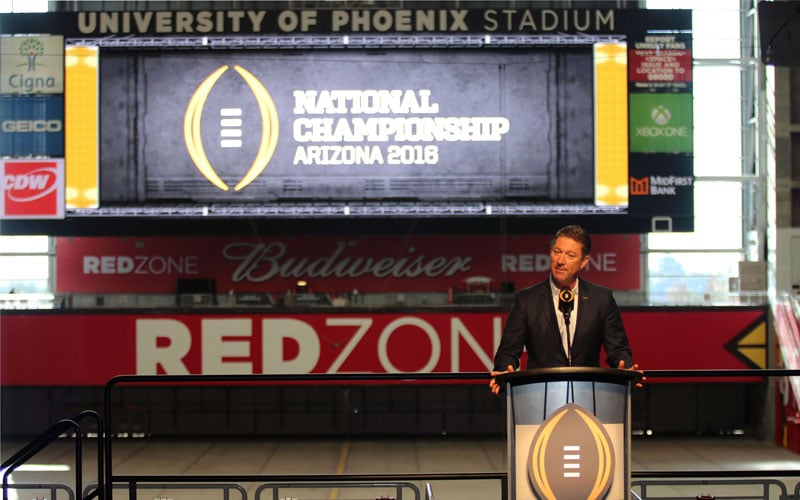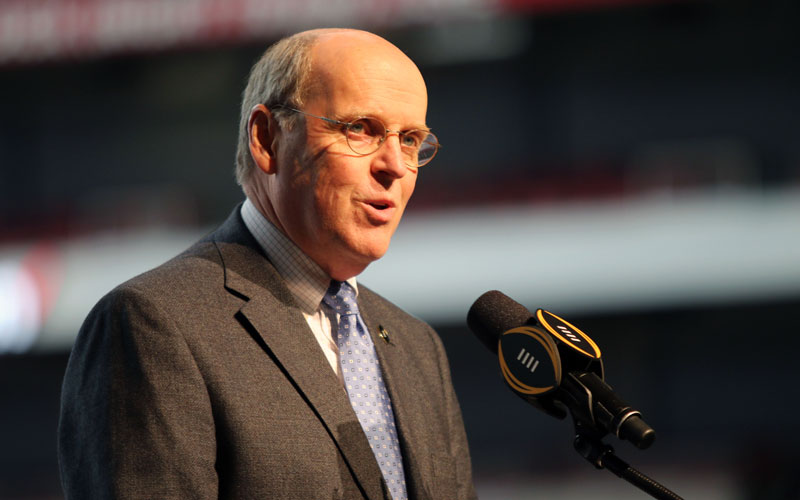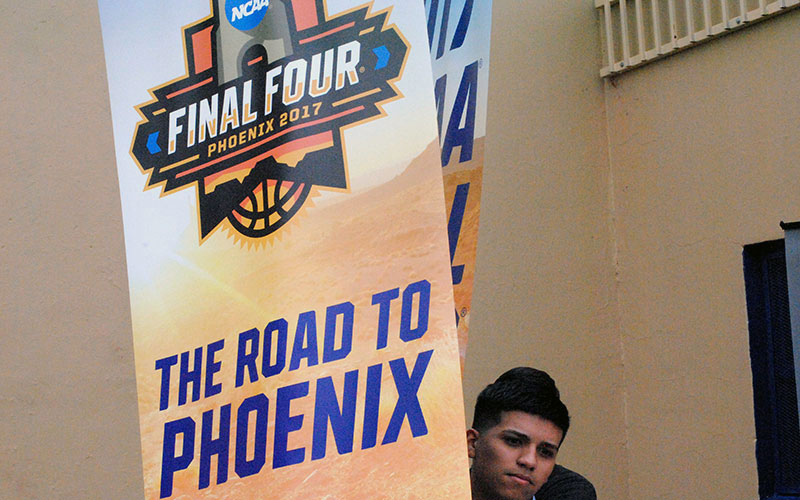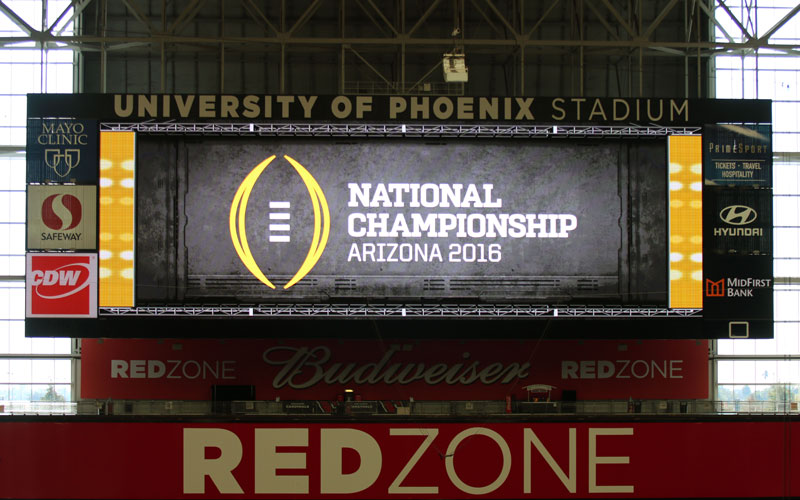
Arizona Organizing Committee Co-Chair Brad Wright explains some of the events that will be held in conjunction with the College Football Playoff National Championship Game. (Photo by Kris Vossmer/Cronkite News)

College Football Playoff Executive Director Bill Hancock shares details of the events leading up to the Jan. 11 championship game. (Photo by Kris Vossmer/Cronkite News)

The 2017 Final Four will mark the third year a major championship sporting event will have been held in Arizona. (Photo by Bill Slane/Cronkite News)

One of many major sporting events headed to Arizona, the College Football Playoff National Championship Game will be held at University of Phoenix Stadium. (Photo by Kris Vossmer/Cronkite News)
GLENDALE — In the middle of a three-year run that includes the Super Bowl, Pro Bowl, College Football Playoff National Championship and the NCAA Men’s Basketball Final Four, the Greater Phoenix area has established itself as a major player in the battle to host the biggest national and international sporting events.
While Arizona lost bids for next year’s Republican and Democratic national conventions, the MLB All-Star Game, NBA All-Star Game and Wrestlemania have all come to the Valley in the last 10 years.
Read more:
Arizona looks for economic boost from football playoff, other events
College Football Playoff will turn downtown Phoenix into pigskin wonderland
College Football Playoff National Championship using Super Bowl XLIX as blueprint
“There’s a lot of appeal in bringing events to Phoenix,” said Mike Nealy, executive director of the BattleFrog Fiesta Bowl. “I think you’re exposing people to Phoenix that maybe have not seen what Phoenix is.”
Less than five months after the College Football Playoff National Championship game is played in Glendale’s University of Phoenix Stadium in January, the Valley will be back in the sports spotlight as one of 10 metropolitan areas in the United States to host games in the 2016 Copa América Centenario. Sixteen countries from across the Americas will play in the international soccer tournament from June 3 through June 26.
The longest-running international soccer tournament, the cup has never been played outside of South America, but is doing so to mark its 100th year. The U.S. men’s national team, which gets an automatic bid for hosting, will be making its third appearance in the tournament.
“It’s exciting,” Glendale Mayor Jerry Weiers said of the cup games that will be played at University of Phoenix Stadium. “Once again it shows that Glendale understands how to put these events on.”
With the city sporting the slogan, “Glendale’s Got Game,” it’s clear that Glendale puts an emphasis on landing these types of mega-events, a feeling shared by others across the Valley and around Arizona.
“This is what we do. We are a world-class city and we host world-class events,” said Brad Wright, co-chair of the Arizona Organizing Committee that’s overseeing the college football championship. “We’re on a roll.”
Nealy agreed.
“The events we’re bringing in are high-caliber, high-profile events that people want to be a part of,” Nealy said.
Looking ahead to 2017, the Valley will host the Final Four for the first time.
Organizers of college basketball’s signature event are already working to leave their mark on the area, with several days of activities planned for the same locations as the Super Bowl and CFP National Championship.
“It’s not just about the incredible weekend,” said Dawn Rogers, executive director and CEO of the Phoenix Final Four. “It’s about what the Final Four leaves the community with.”
In November, Phoenix Final Four officials announced that Harmon Park, on Fifth Avenue at Buckeye Road in Phoenix, will be renovated as part of the NCAA’s Legacy Restorations program. Final Four organizers say this is the first of several community projects they will bring to the Valley.
The CFP National Championship is also getting involved in giving back to the community. On Nov. 16, the Arizona Organizing Committee announced that, in coordination with the CFP National Championship, the groups funded 284 classroom projects across Arizona with an award of $208,856, according to the committee.
While major football, basketball and baseball events have all found homes in the Valley, it does not appear a show on ice is on the horizon.
The Arizona Coyotes were supposed to host the NHL All-Star Game in 2006 but the All-Star Weekend was canceled due to the Winter Olympics. As one of three NHL markets that have never hosted the annual event, along with Anaheim and Winnipeg, it would seem that it would be next on Phoenix’s to-do list. However, after the legal battles over the summer that resulted in a new two-year lease deal between the team and Glendale and a renewed uncertainty around the franchise’s long-term viability in the area, Craig Morgan of arizonasports.com reported that the game will not be coming here any time soon.
On top of hosting national events such as the Super Bowl and Final Four, Arizona also plays host to large-scale annual events, including the Waste Management Phoenix Open in golf and Sprint Cup Series races at Phoenix International Raceway.
“We seem to have that niche with the sports world,” Nealy said. “But we also have our own sporting events as well.”
The Waste Management Phoenix Open, the 2014 PGA Tour Tournament of the Year, is one of the largest stops on the tour and continues to grow each year. With a 24.5 percent attendance growth since 2010, the tournament hit an overall record number of 564,368 in 2015.
The 2015 open brought with it an estimated $227 million in economic impact to the region, according to Waste Management’s Sustainability report, which would make it one of the largest economic impacts of any golf event in the country.
Arizona is also a host to three annual bowl games: the BattleFrog Fiesta Bowl, Motel 6 Cactus Bowl and NOVA Home Loans Arizona Bowl.
The Arizona State Sun Devils will face the West Virginia Mountaineers in the Motel 6 Cactus Bowl at Chase Field on Jan. 2. The inaugural Arizona Bowl, which pits the Nevada Wolf Pack against the Colorado State Rams, will be held Dec. 29 at Arizona Stadium in Tucson. On New Year’s Day, the BattleFrog Fiesta Bowl will have Notre Dame’s Fighting Irish playing last year’s, the Ohio State Buckeyes.
Nealy’s Fiesta Bowl is also an important regular factor in regard to determining college football’s national champion. While the national championship that will be held in Glendale in January is a result of an open bidding process similar to how cities are awarded Super Bowls, the Fiesta Bowl is part of a playoff semifinal rotation and is set to host semifinal games in 2017 and 2020 .
In the last five years, the Fiesta Bowl has generated more than $1 billion in economic impact for the region, according to studies by the W.P. Carey Center for Competitiveness and Prosperity.
The Arizona Bowl will be the first bowl game in Tucson since 1999, when the Insight.com Bowl, now known as the Motel 6 Cactus Bowl, left Arizona Stadium for the Phoenix area.
“There was a core group of people who wanted the bowl back because (Tucson is) certainly an ideal spot to have a bowl game,” Alan Young, CEO of the Arizona Sports and Entertainment Commission, said in an interview with Wake Up Tucson. “As the sports commission, this is what we do. We bring events into the community from outside to create economic impact.”
The University of Arizona Eller College of Management projects that the Arizona Bowl will generate around $25 million from tourism, part-time jobs and recreational activities surrounding the game. Organizers say that because the game will be held during the holidays, visiting teams and fans will help fill otherwise empty hotels and restaurants.
“It will be a lot more than just the bowl game,” Young said. “It’s going to be a weeklong of a lot of activities – pregame, block parties and player dinners that will excite the whole community and football industry.”
Based on the results from previous games during the Bowl Championship Series (BCS) era, organizers of the CFP National Championship expect the game to leave a significant economic legacy.
“If you look at the Super Bowl, it was $719 million in economic impact. The last four BCS games we hosted in Arizona, a combined $646.2 million, W.P. Carey Business numbers,” Wright said. “We expect this game, now that it’s a four-day celebration of college football with all these events and activities around the game, will be equally huge.”
So what’s next?
“We have the infrastructure and the community to do these things well,” Wright said. “I can’t give away any secrets but I’m sure there will be some things coming.”
“If they keep coming then we’re going to support them,” Nealy said. “So let them come.”